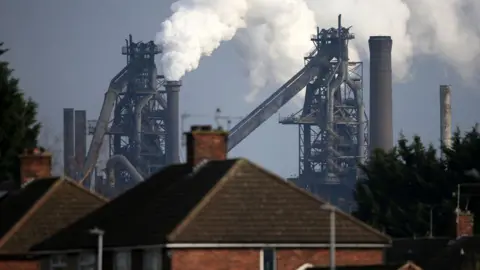### The Troubled Future of British Steel: A Closer Look
The plight of British Steel, particularly at its pivotal plant located in Scunthorpe, has escalated to critical levels. As this prominent site nears the brink of closure, the UK government is stepping in to avert a major economic setback. This intervention comes amidst calls for emergency legislation that would allow the government to assume control over aspects of the company’s operations, fulfilling the urgent need to sustain its output.
According to reports, Members of Parliament (MPs) were recalled from their Easter break to discuss and potentially pass this emergency law, underscoring the urgency of the situation. The Scunthorpe facility employs about 2,700 workers, representing approximately three-quarters of British Steel’s entire workforce. Notably, it is the last of its kind in the UK capable of producing virgin steel—an essential raw material used in key construction projects including buildings and railways. The facility employs two large blast furnaces that result in steel with fewer imperfections compared to recycled alternatives, a critical factor for industries that rely on high-quality steel.
### Ownership and Financial Struggles
British Steel’s ownership history reflects a turbulent recent past. After experiencing financial difficulties, the UK government’s insolvency service took control of the company in 2019. It was then sold to the Chinese conglomerate Jingye in 2020. Despite an investment of £1.2 billion aimed at revitalizing the operation, the plant has been losing approximately £700,000 daily, prompting the company to initiate a consultation on potential job cuts extending over 45 days.
Jingye has attributed the ongoing losses to several factors, including unfavorable market conditions, tariffs, and the immense costs associated with transitioning to environmentally friendly production methods. The blast furnaces operating at the Scunthorpe plant depend on coking coal and iron pellets, essential raw materials which are reportedly running low, adding another layer of urgency to the situation.
### Government Intervention
The recent decision by Prime Minister Sir Keir Starmer to fast-track legislation illustrates the government’s firm stance on protecting the steel industry. Under this proposed law, the government would gain the power to order essential raw materials for the plant, as well as the authority to direct the operations and workforce of British Steel. Importantly, this action stops short of full nationalization, which would involve total government ownership but emphasizes the serious commitment to keep operations ongoing.
The government has instructed UK management to prioritize the operational status of the facility. The proposed emergency legislation would enable any employees dismissed by Jingye to be reinstated, thereby safeguarding jobs in this struggling sector. The ongoing discussions with Jingye have faced significant obstacles; the government initially proposed buying the necessary raw materials, a suggestion that was reportedly declined by the company.
### Broader Implications for the UK Steel Industry
The challenges facing British Steel are symptomatic of deeper issues within the entire UK steel industry. Currently, the industry employs a considerable workforce and is linked to thousands of other firms across the country. With declining production numbers in recent years, additional pressures arose following the introduction of a 25% tariff on imported steel by the US that has exacerbated the existing competitive disadvantages.
Other significant players in the UK steel market include Tata Steel at Port Talbot, which previously was the largest producer of virgin steel before halting operations due to losses. Similarly, other firms like Liberty Steel, Celsa, and Marcegaglia are concurrently facing their own struggles amid rising energy prices and foreign competition.
In 2023 alone, the UK steel industry contributed only £2.3 billion to the national economy, accounting for a mere 0.1% of total output. In stark contrast, steel production in China reached over 1 billion tonnes, making it the world leader by a significant margin. These statistics underline the dire state of the UK’s steel market, reinforcing the need for viable solutions to ensure its survival and competitiveness in the global arena.
### Conclusion
As British Steel teeters on the edge of an economic cliff, the involvement of government measures is a critical development in determining the future of not just this company, but the UK’s entire steel industry. With jobs, economic stability, and national interests on the line, the coming days will be pivotal as stakeholders grapple with the challenges that lay ahead. The urgency of legislative action reflects a broader commitment to safeguarding Britain’s industrial heritage in the face of modern economic realities.



